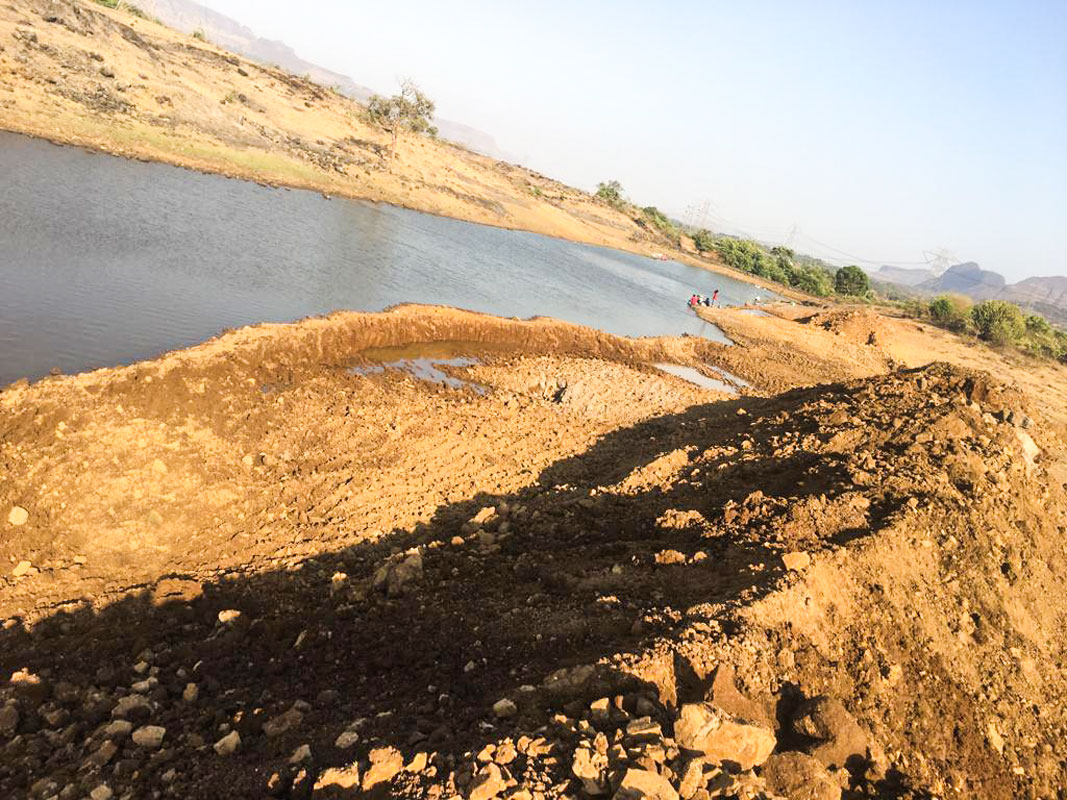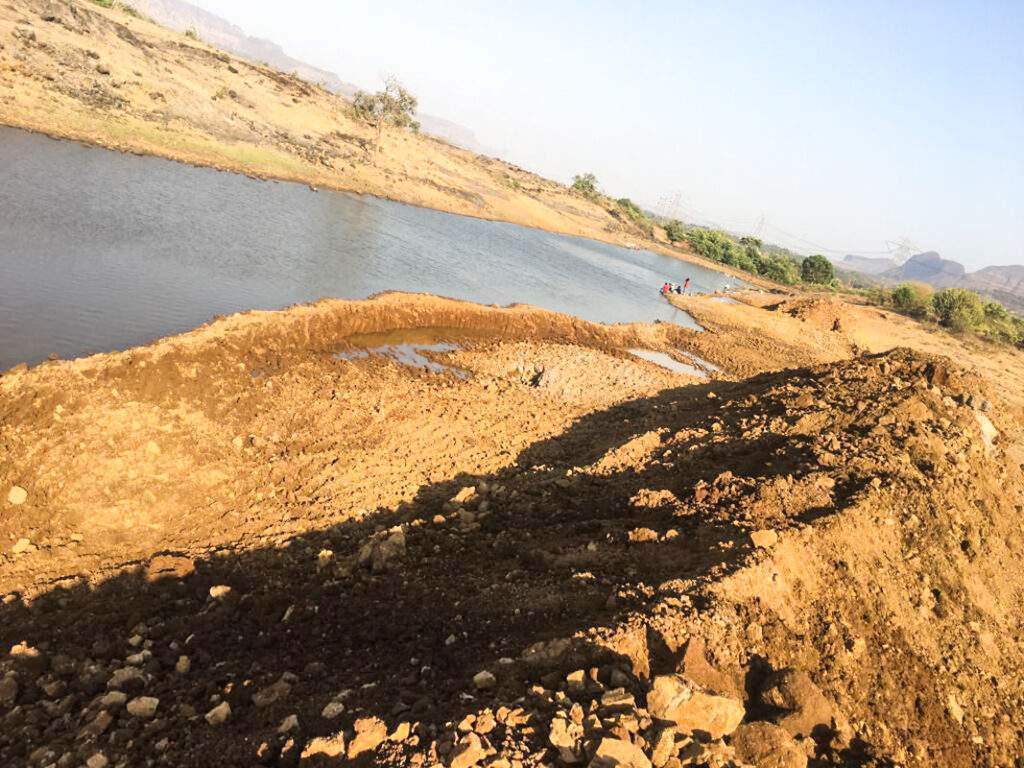Several districts in Marathwada and North Maharashtra region have always suffered from deficient rainfall, and been afflicted with frequent and severe drought. With water storage facilities being near-nil in several villages, which had received barely 50 per cent of the annual monsoon rainfall in 2018, a “high-magnitude drought resulted in several villages near Pune, hitting hard the livelihood and survival of destitute people living in these areas,” says Pankaj Patel, past president of Rotary Club of Pune Far East, and District Director (RID 3131), Happy Village.

Quoting statistics, he says around 60 per cent or 85.76 lakh hectares of the total cultivable land in Maharashtra had been hit that year, affecting adversely some 82.27 lakh farmers. The State government urged NGOs and corporates to work together to tackle the scarce water resources and give a solution to villagers and farmers. Women were particularly hit as they had to trudge long distances to fetch water in pots for drinking, cooking and other use.
The genesis
Interestingly enough, the seed for this project was laid not during arid conditions but on a fine cloudy day, with greenery all around. Patel recalls that along with some Rotarians they had gone to visit a historic place called Nane Ghat. “Near a culvert we saw a man resting, using a stone as his pillow. As we were admiring the sky on a cloudy day, he said: ‘Isn’t the whole area very beautiful and green and filled with water? But if you come on an arid day you won’t even get a glass of water to drink, as all the rainwater would have disappeared.”
As they spoke a huge herd of cows passed by and the elderly man, who happened to be a farmer, said: “Forget us human beings, there wont be any water available for Laxmi too.” The ‘Laxmi’, the Rotarians found out, was a reference to the cow; in that region the cow is hugely respected and called ‘Laxmi’.
One of the major reasons for the success of this programme was the involvement of the local community — both the villagers and the farmers — right from the beginning.
— Pankaj Patel
past president, RC Pune Far East
So when the opportunity came to do a large project in the area, his club, RC Pune Far East, RID 3131, partnered with Tata Technologies to undertake a significant project in one of Rotary’s major areas of focus — Water and Sanitation.
After intensive community mapping by both the partners, it was found that many villages receive rainfall during the monsoon season but have no storage capacity to retain that water, resulting in scarcity of drinking water for both humans and cattle, as also for farming. Provision of robust storage facilities such as construction of bunds and deepening of streams to increase water percolation and raise the water table of wells and borewells in the area were the crying need of the day.
The survey found that if a comprehensive water harvesting and conservation project was undertaken, “it could build a one-time water storage of at least 120 million litres, with good percolation multiplying the storage capacity by 1.5 to 5 times. The borewells and wells could also be recharged for a whole year and till the onset of the next monsoon.”

Four villages were identified for this project, the total cost of which exceeded $96,000, collected through a contribution of ₹22.75 lakh from Tata Technologies, RC Pune Far East, RC Springdale, RID 6110 (international partner), and supporting Rotary Clubs of Pune University and Pune Central. These are Nagnathwadi (Satara district), Pimpalgaon Lingi (Osmanabad district), Ghatghar and Tambe, both in Pune district. Four huge rainwater harvesting pits were created in these villages by excavating soil. Thanks to its cascading effect, six other neighbouring villages — also benefitted from this water conservation project with an increase in the water table. About 13,000 people in the four villages were direct beneficiaries, with additional benefit to dwellers of six other villagers.
Project begins
The first part of the project began at the Pimpalgaon Lingi village in Osmanabad district, where a 2km- long nullah was deepened through desilting. Later two more nullahs were desilted. New bunds were created and existing ones reparied to prevent water runoff.
In Nagnathwadi village, 13 bunds were constructed on an existing water stream coming from the mountains to block the draining away of water and facilitate better percolation.
Sushil Gupta convinced me that water was an extremely important issue in India, and necessary for the sustainability of the nation and its millions.
— Anubhav Kapoor
former head of global corporate sustainability, Tata Technologies
In Ghatghar village, a storage dam, that was almost defunct, was deepened by excavating the accumulated soil. This allowed water storage and percolation upward of 131 million litres. In Tambe village, where RC Pune Far East runs an excellent school, with e-Learning facilities, 11 bunds were constructed on the existing water stream to block water runoff and facilitate better percolation.
“What was most satisfying to us was that 1,120 farmers were major beneficiaries; thanks to this project which created or rejuvenated so many waterbodies, these farmers now have new farming opportunities which will enhance their income.”
Training of farmers
With help from the Krishi Vigyan Kendra, the Rotarians also conducted training of 200 farmers in modern agricultural techniques and farm-based self-employment opportunities, and more important, soil and water conservation techniques.
As the project was on for nearly 18 months “we Rotarians would regularly go to the field as the excavators and other equipment were pressed into service to broaden and deepen existing but now-defunct waterways. This project materialised thanks to a major contribution from Tata Technologies, and Anubhav Kapoor, who was then heading global corporate sustainability at the company and who is now a Trustee at the Cummins India Foundation. Our international partner Rotary Club of Springdale, USA, also took active interest in monitoring this project,” Patel said, adding that his club member Raj Kumar Magar was appointed to lead and monitor this project.
500 hectares benefit
One outcome of the project is that about 500 hectares of agricultural land in these villages has benefitted by the harvesting of rainwater; the groundwater level has gone up recharging borewells in the region. “We are happy to find that now villagers have water available for drinking and daily domestic chores, and no longer have to depend on tankers to bring in the water,” he added.
The women, specially, are very happy, as the most arduous part of their daily labour — walking for miles to fetch water — is now behind them.
Another positive outcome of this project was that the nutrient-rich soil excavated from the dry waterbodies was distributed among the farmers to enriching the soil in some of their barren fields.
“We are now optimistic that with sufficient water available for their crops, the farmers will have increased income and will no longer have to migrate to urban areas for their livelihood. Water availability will also help in growing multiple crops and improve the quality of life of our farmers in the coming years,” Patel added.
To make the project sustainable, the accent was always on training for better income generation opportunities. A comprehensive training programme conducted for the villagers, again with the help of Krishi Vigyan Kendra, focused on self-employment. The course material covered topics such as nursery management, post-harvest technology, vermiculture, setting up a hi-tech polyhouse to get better farming results and crop patterns. Training was also given for entrepreneurship-based programmes such as beekeeping, poultry and goat farming. This was done at the Krishi Vigyan Kendra campus and on the farmer’s fields by specialised scientists from the Kendra.
“One of the major reasons for the success of this programme was the involvement of the local community — both the villagers and the farmers — right from the beginning. As water is their lifeline, they took keen interest in this project, provided land for the water pits, put in labour and were keen to ensure that this becomes a sustainable project for a long term.”
The villagers have been given the onus of maintaining the waterbodies, desilting them regularly so that they get a sustainable supply of water and the monsoon rainfall does not just drain away for lack of storage capacity, he added.
The best reward these Rotarians got was when the local MP, Dr Amul Kolhe, soon after the completion of the project, requested the Rotarians to accompany him to one of the villages where rainwater havesting had been done and which came under his constituency. After examining the waterbodies brimming with water, he said: “This is fantastic work; you Rotarians have managed to do what the government could not do in 17 years.”
A Rotary-Tata partnership

Anubhav Kapoor, former head of global corporate sustainability at Tata Technologies, recalls the April of 2018, when he and Pankaj Patel met the incoming RI President Barry Rassin in Mumbai. Both of them had worked together in literacy and wanted to do a large project. Rassin invited him to the Toronto Convention, which he attended to speak on CSR. “He suggested I explore Rotary’s Global Grants Programme.”
Meanwhile, in Delhi he met the then TRF Trustee Sushil Gupta; “a significant meeting that shaped up Tata Technologies’ CSR programme. I had one of the best Kavha teas in his office and his passion and knowledge on water management and watershed projects in India had me thinking for many weeks thereafter. He convinced me that water is an extremely important issue in India, and necessary for the sustainability of the nation and its millions,” says Kapoor.
In July 2018, Tata Technologies signed an MOU with TRF for ₹1 crore to support four global grants in education and literacy at the TRF office in Delhi.
He adds that the Toronto Convention left him “overwhelmed” about the size and scale of the work Rotarians were doing “everyday to make our world a better place”. Further discussions with Sushil Gupta shaped the Water Management Programme of Tata Technologies and the water harvesting project done by the Pune clubs in four villages of Maharashtra.








